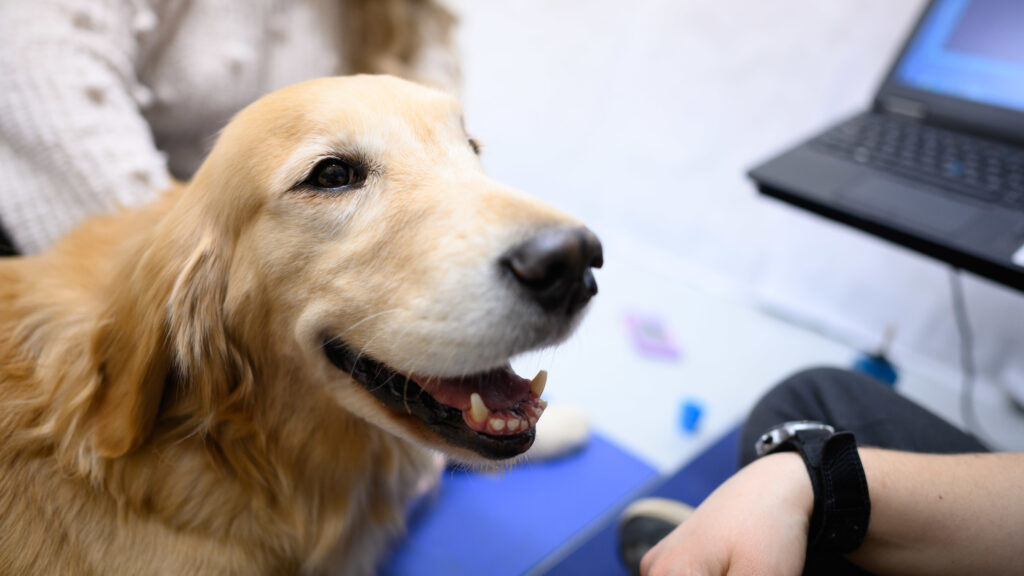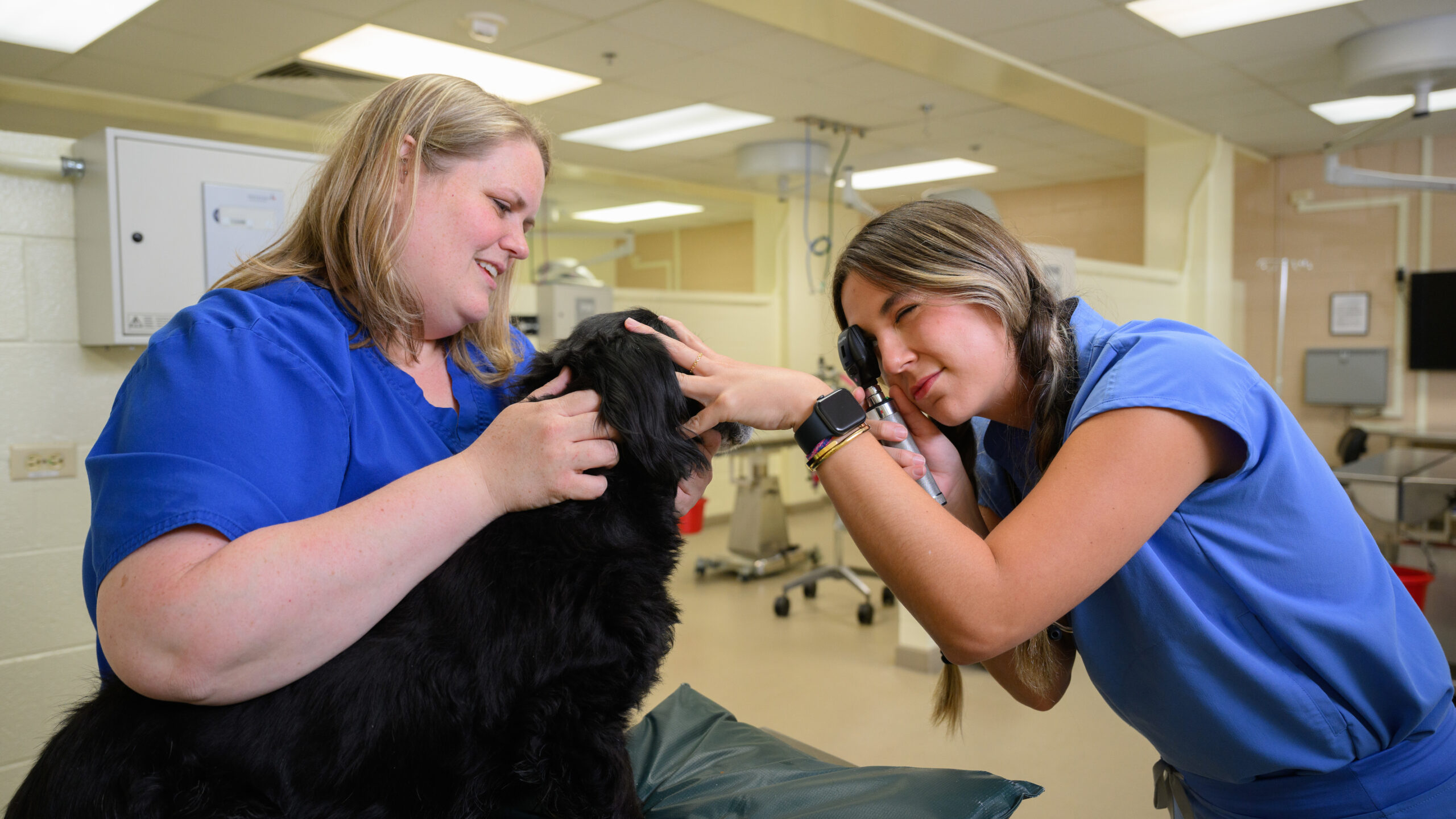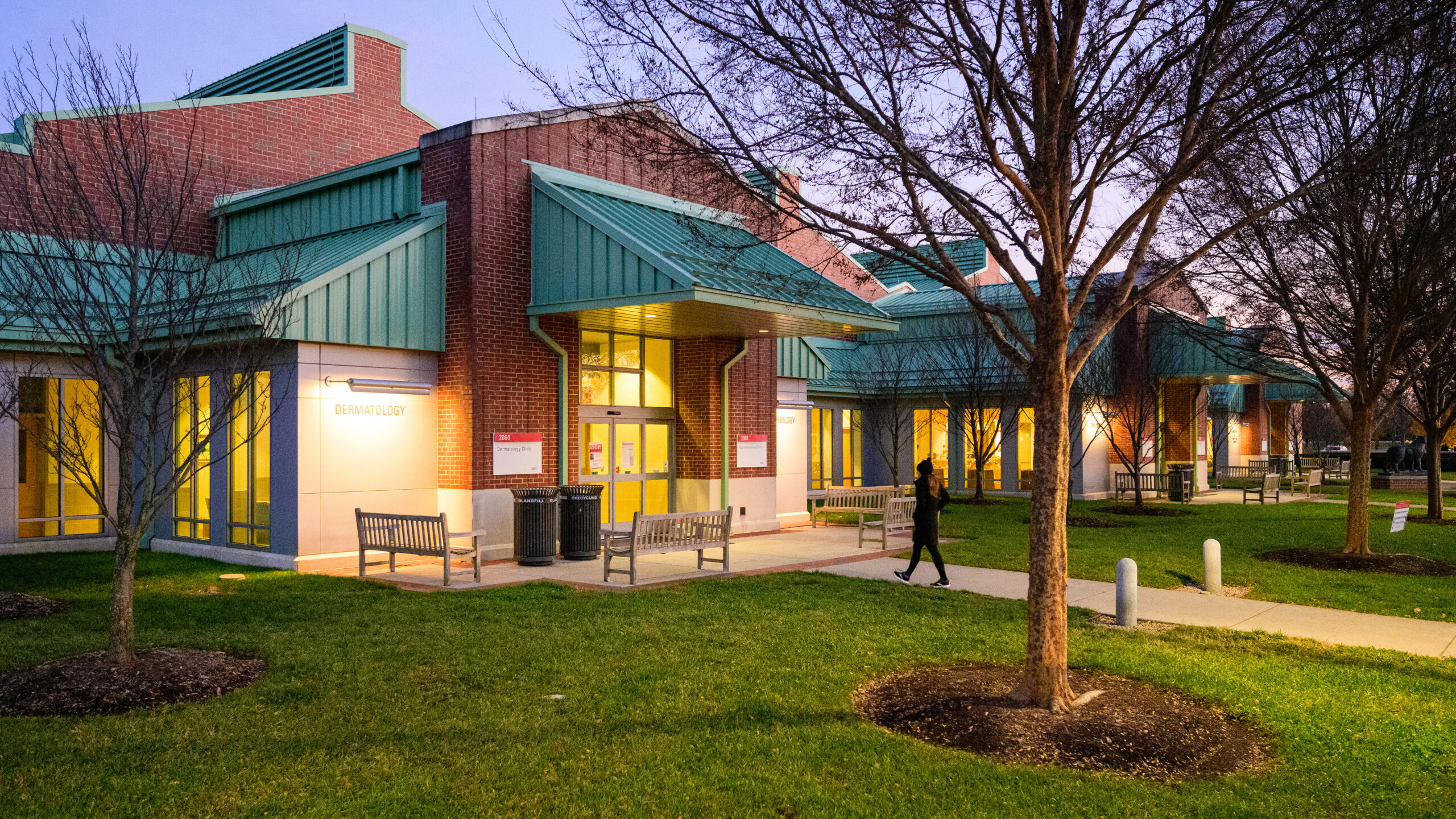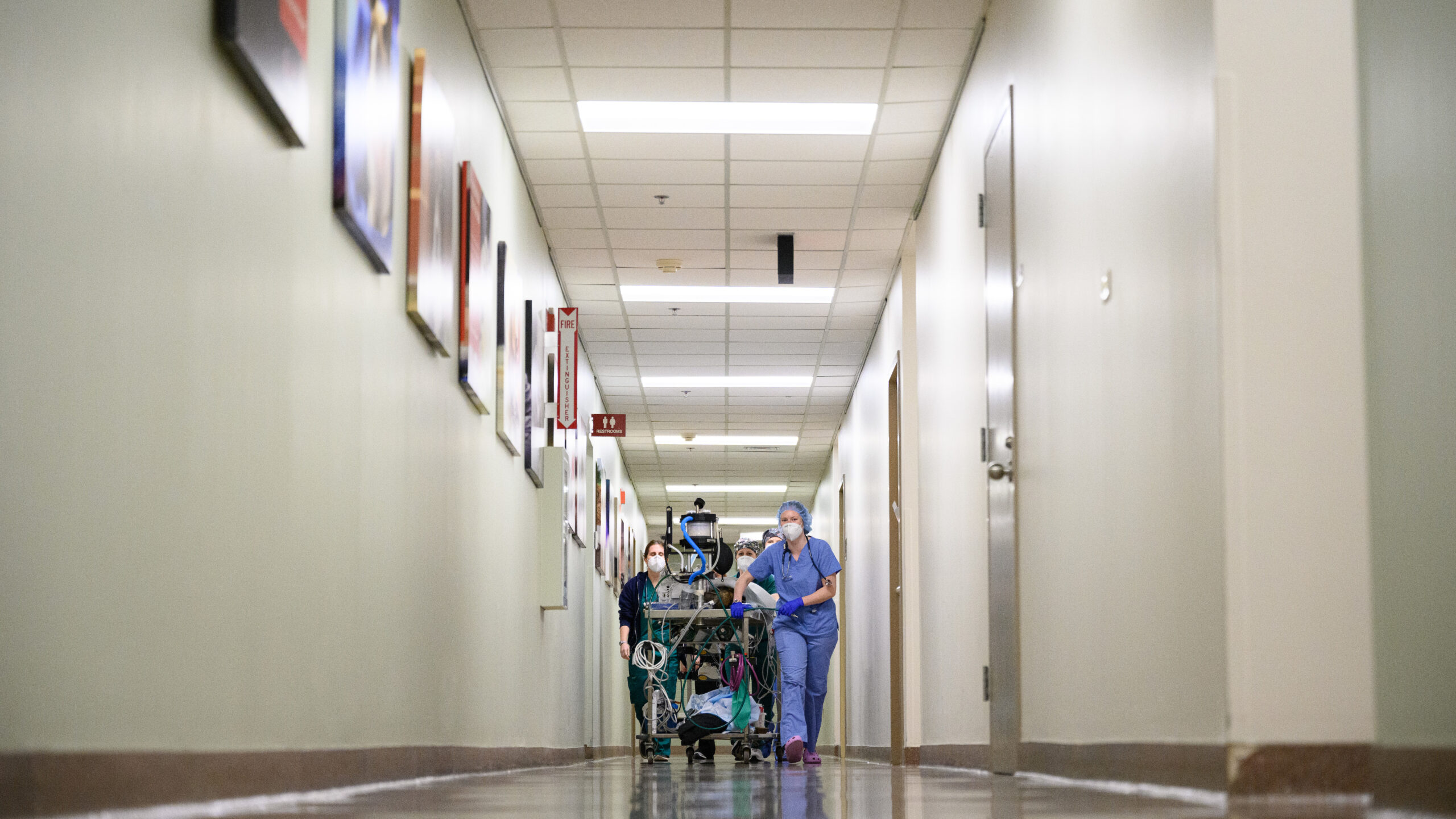Small Animal: Behavioral Medicine
The Behavioral Medicine Service specializes in the treatment of behavior disorders in companion animals.

Overview
We are located in the Veterinary Health and Wellness Center at the Veterinary Hospital. Our services include comprehensive behavioral consultations for those pets with significant behavioral problems or pathological behavioral disorders.
Common problems we address include:
- Jumping up
- Barking or excessive meowing
- Destructive behaviors, such as chewing and scratching
- Hyperexcitability
- Elimination problems or house-soiling
- Separation distress related problems
- Anxieties, fears and phobias
- Compulsive or other abnormal repetitive disorders
- Many types of aggression
- Behavior problems associated with aging
Appointments and Referrals
New Clients and Referrals
Behavioral History
Before visiting, please fill out a behavioral history form for your pet and return it at least one week prior to the appointment. This information will help us to plan for your pet’s consultation in order to maximize your pet’s comfort and safety while minimizing any undue stress. It will aid us to focus on the progression of the problem and provide details of previous management and treatment and your pet’s response to these.
Please download the following form (canine or feline), fill it out electronically, save it, and email it as an attachment to us. Alternately, if you prefer, you may print out the form, then fill it out. It can be emailed to the Behavior Medicine Service at ncstatevetbehavior@ncsu.edu, faxed to 919-513-6905 or sent by US mail. Choose either the Canine Behavioral History Form or the Feline Behavioral History Form. Please complete the relevant form and send to us so that we have it in our office at least one week prior to your appointment. EACH pet must have its OWN history form filled.
Medical History
We are committed to providing your pet the best possible care, and to help achieve this, we request that the following information be faxed or emailed to us from your primary care veterinarian at least one week prior to your appointment:
- Medical history for the last year
- Vaccination records- all pets must have proof of current rabies vaccination prior to the consultation.
- Lab work results (we recommend a CBC, serum chemistry panel, urinalysis and thyroid be performed within the last year)
Returning Clients
Follow up Visits
Your clinician likely discussed with you the need to return for additional behavior follow up appointments at your first consultation. These visits are intended to review how your pet is doing, adjust medications if needed and to build upon the foundation of the initial treatment plan with more structured behavior modification exercises tailored to your pet’s specific problem(s). These visits typically last ~1 to 1 ½ hours. Most pets will need at least 1 to 2 recheck visits in the first 6 months of treatment.
Behavior Modification Appointments
Our qualified Behavior Technician, Monica Henderson, is happy to schedule an individual “Behavior Modification Appointment” with you and your pet.
- During this time she can help you and your pet learn to use new tools, such as a head halter, no pull harness, basket muzzles or clicker training.
- Some foundation training skills are critical for the success of your pet’s treatment plan. A Behavior Modification Appointment can be used to help guide you on the best techniques to teach your pet these new behaviors, such as eye contact, targeting, go to mat, relax, go find, and more.
- When needed we can help you implement specific exercises recommended in your treatment plan, such as response substitution or systematic desensitization. Please do not hesitate to schedule a session with us at any time during your pet’s treatment plan.
Prescription Refills
Medication may be recommended for your pet as part of the behavioral program. We would be glad to manage the prescribed medication for up to a year following your pet’s most recent visit with us. If a refill is needed during this time, please call or e-mail with your specific request (your name, pet’s name, pharmacy name and number, medication name and amount of medication given daily), and a note indicating how your pet is doing. Thereafter, we will need to see your pet in our office once each year in order to continue to prescribe medication.
Long Term Clients
Many patients are able to do well after their treatment plans are implemented, but may need to continue behavior medication for a longer period of time. For patients that need to continue medication long term, we would be glad to continue to prescribe medication but require an annual in-office recheck visit to the Behavioral Medicine Service. We also need to know that your pet is in good health and is monitored annually by his/her primary veterinarian. If we have not seen your pet in over a year, please call us to schedule a 60 minute recheck appointment. Prescriptions cannot be filled for patients whose records are not up-to-date. Please bring with you to that recheck appointment the following:
- Your Pet
- A copy of your pet’s medical record, from your primary veterinarian.
- A copy of wellness lab results (CBC, Chemistry profile). This may be performed by your primary veterinarian at your pet’s annual wellness visit or we can assist at the time of your visit
Appointment Hours
We look forward to working with you to help solve your pet’s behavior problem. Please follow the instructions below to set up an appointment for a dog or cat related problem. Please call the Health and Wellness Center client services desk at 919-513-6999 to schedule your appointment.
Appointments are generally scheduled on Mondays, Tuesdays, and Wednesdays.
Should you need to cancel or reschedule an appointment, please contact the NC State Health and Wellness Center front desk at least three business days in advance in order for us to fill the appointment with pets from our waiting list.
Fees & Payment
Our fees are as follows:
- Full consultation (Dog): $912.23 (two sessions; 1-1.5 hours each)
- Full Consultation (Cat): $706.22 (two sessions; 1-1.5 hours each)
- If your primary concern is housemates fighting amongst each other, the fee structure is as follows:
- Two Dogs in the same home fighting: $1086.25
- Two Cats in the same home fighting: $796.28
- The additional fee is for additional time required for these more complex problems. Both pets should attend the consultation. Please note that 2 persons are needed for safe management of 2 dogs, and each cat should arrive in a separate carrier.)
- Recheck or Annual Appointments $330.69 (approximately 1 hour)
- Recheck or Annual Appointments 2nd (same home) Canine $125.00
- Recheck or Annual Appointments 2nd (same home) Feline $90.06
- Behavior Modification Appointments $88.19 (approximately 30 minutes)
- Vet to Vet consult $350.00
- A deposit of $200 is required upon scheduling the consultation and $50 for rechecks. This can be made by credit card over the phone or a check by mail.
- Any no-show, cancellation or reschedule request made less than three business days prior to the scheduled consultation will result in forfeiture of the full deposit.
Payment
We accept MasterCard, Visa, Discover Card, American Express, cash and checks. We also offer CareCredit financing through Synchrony Bank. Plans available are 6 months no interest or extended financing from 24 to 60 months. Applications can be submitted online at www.carecredit.com to receive an immediate response.
Behavior History
Choose either the Canine Behavioral History Form or the Feline Behavioral History Form. Please complete the relevant form and send to us so that we have it in our office at least one week prior to your appointment. It can be emailed to the Behavior Medicine Service at ncstatevetbehavior@ncsu.edu, faxed to 919-513-6905 or sent by US mail. EACH pet must have its OWN history form filled.
Comments
After each behavior visit or behavior modification appointment, we welcome your brief phone calls and e-mail communications for progress reports, clarification of the current treatment plan, or questions, and are always happy to communicate with your pet’s primary veterinarian.
Please let us know by phone or e-mail if you have any questions. We would like to help you and your pet.
Contact Us
- Hours: Monday through Friday, 8 a.m to 5 p.m
- Phone: 919-513-6999
- Email: ncstatevetbehavior@ncsu.edu
Our Specialties
We specialize in treating anxiety disorders, elimination problems, compulsive behaviors, and numerous other problems in dogs and cats. We also help clients with behavioral concerns and prevention, such as preparing your pet for a new baby, socializing your new puppy, and adding a new pet to your household.
What to Expect
During a behavior consultation at the Behavioral Medicine Service, your clinician will discuss additional history regarding the problems your pet is experiencing, review a behavior profile and further investigate any pertinent medical problems or history that may be linked to the behavior problem. Our behavior support staff will also be involved by recording observations of your pet, getting to know your pet and begin working with your pet with some of the aspects expected to be part of the treatment plan. A thorough discussion of your pet’s diagnosis, prognosis, and treatment options will be included as well as a step by step explanation and demonstration of the treatment plan including management, behavior modification and medication therapy.
Telephone or internet consultation services for clients are not available through the Behavioral Medicine Service.
Frequently Asked Questions
When am I going to see a doctor?
Please note that our Interns and Residents (aka House Officers), are fully licensed doctors with the same education and credentials as a general practitioner. There will ALWAYS be a doctor in charge of and supervising all aspects of patient care at the VH. In many cases multiple specialists may consult on a patient should their expertise be required. Typically, a fourth-year student will first collect a detailed history and present this information to the doctor in charge. You will then have an opportunity to discuss things in detail with the doctor and together you and he/she will formulate a diagnostic and treatment plan.
What does it mean to be a ‘teaching hospital’?
In addition to having access to cutting edge diagnostic tools and therapeutic alternatives, the most unique aspect of our facility is that every patient is a learning opportunity for our students. Much of this teaching is done ‘behind the scenes’ as we discuss your pets’ diagnostics and care. What this means to you, the client, is that the process may take somewhat longer than it would at a private veterinarian practice. However, this also means that we have the ability to consult with multiple doctors and a variety of specialists in complex cases.
My doctor introduced him/herself as an Intern or a Resident – what does that mean?
It is important to understand that every intern or resident at the VH is a fully licensed doctor with the same education and credentials as a general practitioner. Interns and residents have chosen to pursue additional, in-depth postgraduate clinical training and were selected by us in a highly competitive international application process. We think you are in great hands!
Is there food and water available for my pet while I wait?
Feel free to ask the front desk for a bowl if you would like to offer water to your pet. However, we do ask that you refrain from feeding your pet. Many procedures require sedation or medication with drugs that could upset your companion’s stomach if there is food present. If your pet must eat for medical reasons (eg. diabetes), please ask the front desk to inform the doctor in charge and make sure they are aware of this first.
I am finished with my visit, why do I have to wait?
One of our goals for our clients is that everyone leaves with detailed discharge instructions. We write our discharge instructions in as detailed manner as possible to help summarize the information covered during the visit and give you specific instructions as to medications, diet, activity restriction, and any other pertinent aspect of care. It may take us some additional time to write these for you; however, this can significantly ease the transition home and back to your regular veterinarian.
You are a State facility, so why are your fees so high?
The VH is a not-for-profit health care center and receives less than 2% of operating costs from the State of North Carolina. The majority of our operating costs are paid by client fees and donations. In fact, many of the state-of-the-art diagnostic and treatment options we offer are only possible because of generous gifts from our clients. Our fees are set to cover the balance of our operating costs, and we are always looking for ways to provide better service at lower cost. Total costs are comparable to those of veterinarian specialists in private practice.
Resources
- Find a primary care veterinarian
- What is a veterinary behaviorist?
- How not to greet a dog
- NC State College of Veterinary Medicine


